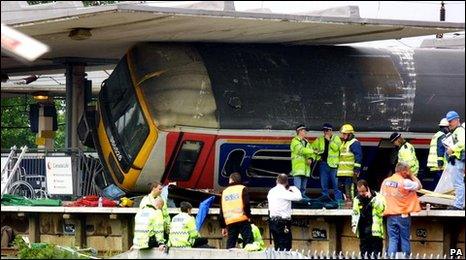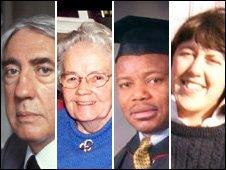Potters Bar victims' families await answers
- Published

The fourth carriage of the London-King's Lynn service ended up on the platform
On 10 May 2002 the 1245 London to King's Lynn service thundered at almost 100mph through points just south of Potters Bar.
Seconds later, the West Anglia Great Northern train careered off the track, flinging its rear carriage into the air and onto the station platform. Six passengers and a passer-by were killed.

The victims' families have received some compensation
Since that day eight years ago, the families of those seven victims have been demanding to know what really happened that lunchtime in Hertfordshire.
A series of official reports have followed, suggesting loose or missing bolts had been to blame for the derailment, but none has provided them with the definitive explanation the bereaved relatives say they need.
Those families are now hoping the inquest, external into the seven deaths, starting on Tuesday, will provide the answers they have waited so long to hear.
One of those still wanting an explanation is 85-year-old author Nina Bawden, whose husband Austen Kark, a former boss at the BBC's World Service, died that day.
Ms Bawden, who was badly injured in the crash herself, is angry she has had to wait eight years to get answers.
"There should have been an inquest or an inquiry long since," she says. "I think the government's behaved disgracefully by not doing something about it before."
She is also disappointed with the lack of communication from the rail authorities.
"Accidents do happen, but we never had any contact from the railways. No apology. It would have been useless of course, but at some point it would have been comforting if the railways had turned round and actually said 'We are very sorry we killed your husband'," she says.
'Tremendous gap'
Ms Bawden, who has written a book called Dear Austen in a tribute to her late husband, doesn't remember much of the accident.
She recalls how the pair were sharing a joke on their way to a party when Mr Kark was suddenly flung forward and she was thrown under a table.
It was only when she woke up in hospital covered in plaster that she discovered her partner in life hadn't survived.
The death of her husband, who she describes as a "meticulous man" who "never left a thing undone", was "a great loss", she says, and she has often wondered if it would have been better if they had both been killed.
"The suddenness of it is dreadful. I hadn't realised what it would be like," she explains.
"There are many times when I think I would have rather died with my husband. It would have been pleasanter, simpler. But it would have been worse for the children and the family in general."
A Health and Safety Executive report in 2003 concluded that poor maintenance of a set of points had contributed to the derailment.
No criminal charges were brought against any rail staff, but Network Rail and rail maintenance firm Jarvis, now in administration, later accepted legal responsibility for the resulting compensation claims.
Finding peace
Ms Bawden, who has campaigned vociferously for a public inquiry into the derailment, now hopes the inquest - delayed for a variety of reasons, including the Grayrigg rail crash in Cumbria in 2007 - will remind railway bosses of their responsibility towards passengers.
"People's lives are in the care of the railways when they get on a train," Ms Bawden says. "The railways should remember that."
And for herself, she hopes to find some peace.
"It's a shame we've had to wait so long. I disapprove of this horrible word 'closure', but there's an element of that in it," she adds.
The daughter of 80-year-old Agnes Quinlivan - killed by falling debris as she walked under the railway bridge in Potters Bar that day - is also hoping the inquest will help her come to terms with what happened.
Pat Smith, 61, from Potters Bar, cannot forget the feeling of "disbelief and shock" she felt on hearing of the death of her mother, originally from Ireland, who she describes as devoted great-grandmother and an active member of the community.
"It is surreal. It feels like it is something you're watching on TV," she says. "You are just trying to make sense of it - that she's been killed by a train."
But although Mrs Smith believes the inquest "should have been held six years ago", she still feels a sense of relief that it is finally going ahead. Her wish is that lessons have been learned.
"We cannot undo what's gone on, but we can ensure that there are good systems of management - that weren't in place when the accident happened. That is the hope of all of us," she says.
But most of all, she explains, she wants to ensure her mother will be "finally at peace".
"The last eight years I have been thinking about how she died - I want to start thinking about how she lived," she adds.